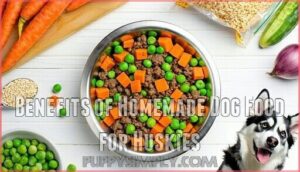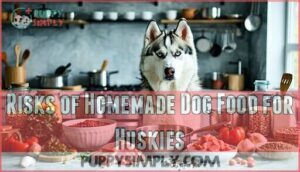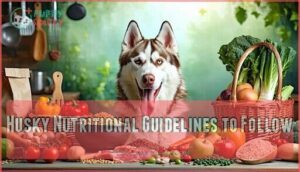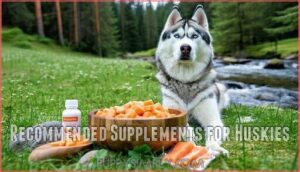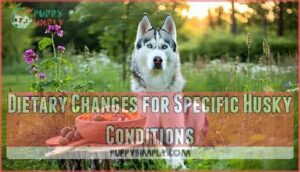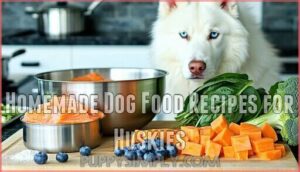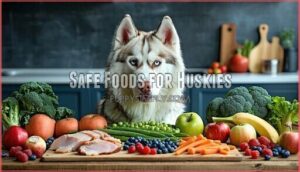This site is supported by our readers. We may earn a commission, at no cost to you, if you purchase through links.
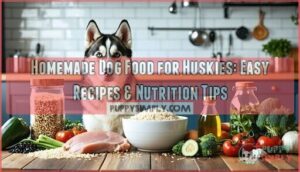
You’ll want to focus on protein-rich recipes with quality meats like chicken, turkey, or beef, paired with complex carbs and healthy fats.
Since huskies burn calories like furnaces, they need nutrient-dense meals that support their active lifestyle and thick double coats.
Balance is key—too much of one nutrient can throw off their entire system.
Start with simple recipes using whole ingredients, and always switch gradually from commercial food.
Your husky’s boundless energy and glossy coat will thank you, but there are important safety considerations and specific ratios that can make or break your homemade feeding success.
Table Of Contents
- Key Takeaways
- Benefits of Homemade Dog Food for Huskies
- Risks of Homemade Dog Food for Huskies
- Husky Nutritional Guidelines to Follow
- Recommended Supplements for Huskies
- Dietary Changes for Specific Husky Conditions
- Homemade Dog Food Recipes for Huskies
- Safe Foods for Huskies
- Storing and Preparing Homemade Dog Food
- Tips for a Successful Transition to Homemade Dog Food
- Frequently Asked Questions (FAQs)
- How do I make food for my husky?
- What is the healthiest dog food for a husky?
- What do vets recommend for homemade dog food?
- What not to feed a siberian husky?
- How much homemade food should huskies eat daily?
- Can puppies eat the same homemade recipes?
- How long does homemade dog food stay fresh?
- What cooking methods are safest for huskies?
- How often should I change homemade recipes?
- Conclusion
Key Takeaways
- Balance protein-rich recipes carefully – You’ll need 25-30% high-quality protein from lean meats like chicken, turkey, or beef, combined with complex carbs and healthy fats to fuel your husky’s high-energy metabolism.
- Transition gradually to avoid digestive upset – You should replace only 25% of commercial food with homemade recipes every few days, allowing your husky’s digestive system to adapt naturally over 2 weeks.
- Watch for nutritional gaps and safety risks – You must avoid toxic ingredients like chocolate, onions, and grapes while ensuring proper mineral balance, as 95% of homemade diets lack essential nutrients without careful planning.
- Store and prepare food safely – You can refrigerate homemade meals for 3-5 days or freeze portions for up to 3 months, but always use proper food handling techniques and consult your vet for balanced recipes.
Benefits of Homemade Dog Food for Huskies
When you’re preparing homemade meals for your husky, you’re taking control of exactly what goes into their bowl, which can lead to better health, improved energy, and a shinier coat.
You’ll also save money while addressing specific dietary needs, allergies, or health conditions that commercial foods often can’t handle as effectively.
Health Benefits
When you switch to homemade dog food, your Husky’s health transforms dramatically.
You’ll notice three major improvements:
- Allergy Control: You can eliminate common allergens like beef, dairy, and wheat that trigger reactions in commercial foods.
- Weight Management: Fresh ingredients and portion control help maintain your Husky’s ideal body weight, reducing joint problems.
- Digestive Health: Without artificial preservatives and fillers, your dog experiences less bloating and better nutrient absorption, leading to improved coat and skin health plus increased energy levels.
Health Issue Management
Your Husky’s health challenges don’t have to be permanent roadblocks. Homemade dog food offers targeted Allergy Management by eliminating common triggers like beef, dairy, and wheat.
You’ll gain precise Weight Control through portion management, supporting Joint Support and reducing arthritis risk.
Dogs with husky food allergies or sensitive stomach food needs benefit from customized ingredients. Homemade diets effectively address itching, dermatitis, and food intolerance while promoting better Digestive Health.
Fresh ingredients also tackle Skin Conditions, creating noticeable improvements in your dog’s comfort and overall well-being through careful ingredient selection.
Improved Energy Levels
When you fuel your Husky with a homemade husky diet, you’re setting the stage for remarkable energy transformation.
Fuel your Husky with fresh ingredients for unstoppable energy and vitality.
Quality ingredients work like premium gasoline in a sports car, delivering sustained power throughout the day. Unlike processed kibble that can cause energy crashes, your high protein dog food recipes provide steady vitality.
Here’s how proper nutrition impacts your Husky’s energy levels:
- Protein Sources: Lean meats like turkey, chicken, and fish build lean muscle mass while providing amino acids that convert directly into sustained energy for your active companion.
- Carb Choices: Complex carbohydrates from sweet potatoes and brown rice release energy slowly, preventing the sugar spikes and crashes common with commercial foods.
- Fat Intake and Mineral Balance: Healthy fats from salmon oil combined with essential vitamins create the perfect fuel blend, while proper Vitamin Impact guarantees maximal metabolism and energy conversion in healthy husky recipes.
Risks of Homemade Dog Food for Huskies
While homemade dog food offers many benefits for your husky, it’s not without its challenges.
You’ll need to navigate potential nutritional imbalances and ingredient safety concerns that could impact your dog’s health if not properly managed, which involves addressing complete concepts to ensure your dog’s well-being.
Nutritional Challenges
While homemade dog food offers many benefits, you’ll face significant nutritional challenges that can impact your husky’s health.
Getting homemade nutrition right takes serious commitment—one wrong balance could harm your husky’s health.
Recipe imbalance is common—95% of homemade diets lack essential nutrients, particularly calcium and phosphorus.
Incomplete nutrition often results from:
- Micronutrient deficiencies (zinc, vitamins B, D, E)
- Poor ingredient sourcing that creates inconsistent nutrient levels
- Inadequate portion control leading to caloric imbalances
Over-supplementation can be as harmful as deficiencies.
Your husky nutrition depends on precise formulation, not guesswork.
A homemade husky diet requires expert guidance to avoid muscle wasting, skeletal problems, and immune dysfunction that develop slowly over months.
Many homemade diets also lack sufficient <strong>omega-3 fatty acids</strong>, impacting skin and coat health.
Ingredient Safety
You’re walking through a minefield when choosing ingredients for homemade dog food for huskies.
Toxic ingredients like chocolate, onions, grapes, and garlic can poison your pup, while allergen awareness helps you spot reactions to beef, dairy, or wheat.
Safe sourcing means buying fresh, quality ingredients from trusted suppliers.
Preparation hygiene requires clean hands, sanitized surfaces, and proper cooking temperatures.
Storage guidelines demand refrigerating meals within two hours and freezing portions for later.
Always research safe foods before adding new ingredients to your husky’s homemade meals.
Husky Nutritional Guidelines to Follow
Creating nutritious homemade meals for your husky requires understanding their specific dietary needs, which differ from other dog breeds due to their high energy and unique metabolism.
You’ll need to balance proteins, carbohydrates, fats, and essential minerals to keep your active companion healthy and thriving, which is crucial for their high energy lifestyle.
Protein and Protein Sources
Adult huskies need at least 18% protein daily, while active dogs require up to 30%.
Lean meats like chicken, turkey, beef, and fish provide complete amino acids for muscle development. Eggs offer excellent protein quality and digestibility factors.
Plant proteins like lentils can supplement but shouldn’t replace animal sources. Consider novel proteins for huskies with protein allergies.
A high-protein diet supports your husky’s energy needs and maintains healthy muscle mass.
Carbohydrates and Carbohydrate Sources
Your husky needs carbohydrates for sustained energy, but not all carbs are created equal.
Complex carbohydrates like sweet potatoes, quinoa, and brown rice provide digestible options that fuel your dog’s active lifestyle without blood sugar spikes.
These energy sources offer valuable fiber content while avoiding sugars found in simple carbs.
Stick to whole grains and starchy vegetables that break down slowly, giving your husky steady power for those long adventures.
Some owners even use sweet potato based treats for training.
Skip corn and white rice—they’re digestive troublemakers.
Dietary Fat Sources
Fat intake should make up 8-20% of your husky’s daily calories, with animal-based sources being most digestible.
Fish oil provides omega-3 fatty acids for coat health and inflammation reduction. Coconut oil offers medium-chain triglycerides that support fat digestion and energy.
Flaxseed oil adds omega balance through plant-based fats. Source variety prevents deficiencies while supporting your husky’s high-energy needs.
Always introduce new fats gradually to avoid digestive upset in your husky nutrition guide.
Essential Minerals
Minerals serve as your husky’s nutritional foundation, supporting bone health, nerve function, and metabolic support throughout their active lifestyle.
Without proper mineral balance, deficiency symptoms can quickly appear.
- Calcium and phosphorus: Essential for strong bones and teeth development
- Iron and zinc: Critical for healthy coat, skin condition, and immune function
- Magnesium: Supports muscle contractions and energy metabolism processes
Quality mineral sources include lean meats, organ tissues, leafy greens, and whole grains in your homemade dog treats.
Each husky nutrition guide emphasizes that balanced minerals prevent developmental issues common in this breed.
Since husky dog food requirements vary by age and activity level, you’ll want to rotate different essential minerals sources weekly.
Remember, too much of certain minerals can block absorption of others, so variety matters more than quantity in your recipes.
Hydration Importance
Water keeps your husky running like a well-oiled machine, supporting everything from muscle function to temperature regulation. Your furry friend needs about 60-80 ml of water per kilogram of body weight daily, with increased requirements during exercise and warm weather.
Watch for dehydration signs like lethargy, dry gums, and poor skin elasticity – these red flags mean you need to act fast. Activity levels directly impact water needs, so active huskies require more frequent hydration breaks.
Keep your husky properly hydrated with these strategies:
- Provide fresh, clean water sources throughout your home and yard
- Monitor electrolyte balance during intense exercise or hot days
- Implement cooling strategies like wet towels or kiddie pools in summer
- Include moisture-rich homemade dog treats and fresh ingredients in their diet
Remember, dehydration impairs both physical and cognitive performance in these athletic dogs, and it is crucial to maintain proper hydration breaks and monitor for dehydration signs to ensure your husky stays healthy and performs well, especially during intense exercise.
Recommended Supplements for Huskies
Even the most nutritious homemade meals can benefit from targeted supplements to address your husky’s specific health needs.
While whole foods provide excellent nutrition, certain supplements can help fill gaps and support areas like joint health, coat condition, and overall well-being that are particularly important for this active breed.
Hip & Joint Support
Joint support supplements can make a world of difference for your husky’s mobility.
Glucosamine benefits include reducing pain, while chondroitin sources improve joint lubrication in 64% of dogs.
Omega-3s from fish oil cut inflammation by 35%.
These supplements help prevent hip dysplasia and maintain healthy weight management, especially important given your husky’s high exercise impact needs.
Many owners also seek a suitable joint supplement to support their husky’s mobility.
Eye Health Supplements
Your Husky’s bright eyes need proper nutrition to stay sharp throughout their active life.
Vision support supplements containing lutein can improve retinal response in just 60 days when dosed at 1 mg/kg daily.
Vitamin A and antioxidant benefits from beta-carotene reduce retinal degeneration risk by 18%.
Omega3 fatty acids from fish oil maintain tear production, preventing dry eye syndrome common in active breeds.
Bilberry extracts help preserve night vision for those late-evening adventures.
Consider exploring options for specialized vision products to support your husky’s eye health.
Follow dosage guidelines carefully, as breed predisposition makes proper supplementation essential for maintaining your Husky’s keen eyesight and overall husky coat health.
Skin Condition Relief
Dealing with skin issues requires targeted nutrition support.
Omega-3 fatty acids reduce inflammation markers by 35%, while maintaining a 5:1 omega-6 to omega-3 ratio decreases itchiness scores by 28%.
Zinc supplementation at 2mg/kg daily manages scaling and flaky skin effectively.
Fish oil added to your husky’s diet reduces dermatitis symptoms by 60% after two months of consistent use, which can be achieved by ensuring the right balance of omega-3 fatty acids and maintaining an appropriate omega-6 to omega-3 ratio.
Multivitamins
Everyone knows that even the best homemade husky diet can have nutritional gaps, but multivitamins bridge those deficiencies effectively.
Extensive multivitamin blends address common gaps in calcium, B-vitamins, and vitamin D, reducing nutrient deficiency symptoms from 34% to under 5%.
Consider these key benefits:
- Vitamin Absorption: Supports ideal nutrient uptake and canine nutrition balance
- Deficiency Symptoms: Prevents phosphorus-calcium imbalances in bone-free recipes
- Synthetic vs Natural: Both forms provide essential nutrients for your husky diet
Follow dosage guidelines carefully, and compare brands for quality assurance in pet nutrition supplements.
Vet Consultation
Why settle for guesswork when your Husky’s health deserves professional insight? Veterinary consultation forms the foundation of successful homemade meals, ensuring recipe adjustments meet your dog’s unique needs.
Your vet provides essential supplement advice through thorough health monitoring, addressing specific dietary concerns with breed specificity in mind. They’ll recommend bloodwork screening every six months for homemade diet-fed Huskies, tailoring pet nutrition advice based on age, size, and existing conditions.
This veterinary advice reduces nutrient deficiency risks from 34% to under 5%, while their dog nutrition tips optimize performance and extend lifespan through expert guidance.
Dietary Changes for Specific Husky Conditions
When your husky shows skin problems, digestive issues, or coat changes, specific dietary adjustments can help address these conditions naturally.
The right combination of ingredients in homemade meals can target everything from chronic itching to dull fur, giving you control over your dog’s healing process.
Coat Color Changes
Over time, coat color changes in your Husky can signal nutritional deficiencies that homemade diets help address.
Zinc deficiency commonly causes pigment loss and coat fading, while inadequate copper leads to lightened fur.
Your dog needs amino acids like tyrosine and phenylalanine for proper melanin synthesis.
Iron-rich foods support healthier pigmentation, and omega-3 supplementation improves coat vibrancy.
These dietary impacts, combined with genetic influence, sunlight exposure, and underlying conditions, affect whether your Husky maintains breed standards for ideal skin health and coat health.
Concurrent GI Signs
When your Husky shows concurrent GI signs like vomiting or diarrhea, targeted dietary adjustments can restore gut health.
High-fat recipes often trigger pancreatitis, while fiber-enriched meals help regulate digestion. Eliminating common food allergies like chicken, dairy, and wheat reduces chronic discomfort.
Probiotic support from plain yogurt aids sensitive stomach issues, and proper hydration strategies prevent dehydration during digestive episodes. Symptoms like these may indicate that your dog requires sensitive stomach dog food.
Key dietary adjustments for GI management:
- Switch to rice and lean protein – These gentle ingredients provide easily digestible nutrition while your Husky’s digestive system recovers from acute flare-ups, reducing strain on sensitive stomach tissues.
Chronic Itching and Dermatitis
While digestive upset affects your Husky’s comfort, chronic itching and dermatitis can make them miserable.
Omega-6 fatty acids restore skin barrier function, reducing scratching episodes substantially. Single animal protein diets help identify food allergies through systematic allergen identification.
Elimination diets pinpoint triggers like chicken or dairy. Omega supplementation with fish provides natural anti-inflammatory EPA and DHA.
Avoid artificial additives that worsen dog allergies. Veterinary diagnosis guarantees proper treatment plans alongside dietary changes for lasting relief from chronic itching, utilizing Omega-6 fatty acids and anti-inflammatory properties.
Dull Coat and Scaling
Beyond the itching and irritation issues, dull coat and scaling present another common concern.
When your Husky’s fur loses its natural luster, it’s often signaling deeper nutritional gaps. Omega Deficiency plays a major role here, as both Omega3 and Omega6 fatty acids are essential for maintaining healthy coat condition. Poor Hydration Levels can worsen scaling, while Zinc Supplementation helps restore that coveted shine.
Key nutritional strategies for improving dull coat and scaling:
- Biotin-fortified homemade recipes resolve flaky skin and promote softer undercoat texture
- Egg yolk additions supply lecithin for smoother coat surface and decreased scaling
- Linoleic acid from safflower oil increases shine and silkiness naturally
- Adequate caloric intake prevents brittle fur caused by underfeeding
- Kelp supplementation provides essential minerals for coat vitality
Allergy Elimination through careful ingredient selection prevents additional coat stress, while proper Bathing Frequency maintains skin health without over-drying.
Dandruff and Crustiness
With deficiency of Omega3 and vitamin A, your Husky’s dandruff and crustiness worsen.
Omega Deficiency creates visible scaling, while poor Hydration Impact leaves skin dry.
Common Allergy Culprits like processed grains trigger irritation.
Combat this dull coat condition by adding salmon, flaxseed, and sweet potato to meals, which provide essential Omega6 fatty acids and minerals, and consider the importance of Breed Predisposition.
Fresh homemade food naturally boosts hydration, and it’s crucial to balance this with the right Bathing Frequency, as over-washing strips natural oils, highlighting the need to avoid skin issues.
Homemade Dog Food Recipes for Huskies
Now that you’ve learned about your husky’s nutritional needs and potential health concerns, it’s time to put that knowledge into practice with some tasty homemade recipes.
These four carefully crafted meals will give you practical options to start feeding your husky wholesome, balanced food that supports their high energy and unique dietary requirements.
Blueberry-Banana CBD-Infused Dog Treats
Looking for a sweet way to show your husky some love? These blueberry-banana CBD-infused dog treats pack serious nutritional punch while potentially easing your pup’s stress.
The combination of antioxidant-rich blueberries and potassium-loaded bananas creates a powerhouse snack that supports overall health.
CBD Dosage should match your husky’s weight—typically 0.2mg per pound for anxiety relief. Treat Baking becomes simple with coconut flour and eggs binding everything together.
Here’s what makes these treats special:
- Blueberry Power delivers anthocyanins that fight inflammation and support brain health
- Banana Benefits provide natural sweetness plus heart-healthy potassium
- Anxiety Relief through carefully measured CBD helps nervous huskies stay calm
The dog treats freeze well for up to three months, making batch preparation practical for busy pet parents.
These treats can also offer anti-inflammatory benefits, making them a great choice for dogs with sensitivities.
Chicken & Rice Delight
This classic chicken rice delight recipe combines lean chicken breast, digestible brown rice, nutritious peas, and vibrant carrots for balanced daily meals.
You’ll master simple cooking methods like boiling chicken and steaming vegetables, ensuring proper portion control for your husky’s size.
Store prepared batches safely in refrigerated containers for up to three days, making homemade dog food preparation convenient and cost-effective.
Turkey, Vegetable & Quinoa Feast
Turkey, Vegetable & Quinoa Feast offers your husky a hypoallergenic alternative packed with lean protein and complete amino acids.
This recipe variation combines ground turkey with nutrient-dense quinoa, zucchini, and spinach for ideal dog nutrition.
When ingredient sourcing, choose organic vegetables and high-quality turkey for better results.
Proper portion control helps guarantee your homemade pet meals meet your husky’s energy needs without overfeeding, and simple cooking methods make this husky feeding guide recipe budget-friendly and nutritious.
Beefy & Veggie Medley
This hearty recipe combines ground beef with sweet potato, green beans, and pumpkin for digestive support.
The cost analysis shows beef provides affordable protein while vegetables add fiber and nutrients. Recipe variations include lamb or venison for ingredient sourcing flexibility.
Portion control depends on your husky’s activity level and preferences. This balanced homemade recipe supports ideal dog nutrition, providing a great way to ensure your pet receives the necessary nutrients for optimal health, with complete concepts of nutrition in mind.
Safe Foods for Huskies
When preparing homemade meals for your husky, knowing which safe foods to include protects your dog from toxic ingredients while supporting healthy health.
Many common foods pose serious risks, so understanding safe vegetables, fruit options, and proper grain inclusion becomes essential for any husky diet plan.
Here are key safe food categories for your husky:
- Protein powerhouses: Cooked chicken, turkey, lean beef, salmon, and eggs provide essential amino acids
- Vegetable victories: Sweet potatoes, carrots, green beans, and peas offer vitamins and fiber
- Fruit friends: Blueberries, apples (seedless), and bananas deliver antioxidants in moderation
- Grain goodness: Brown rice, quinoa, and oats supply digestible carbohydrates for sustained energy
Remember that allergy awareness matters greatly. Always introduce new ingredients gradually while monitoring for sensitivities. Skip toxic foods like grapes, onions, and chocolate completely. Always guarantee that chicken is boneless, as cooked bones splinter and pose a hazard.
Storing and Preparing Homemade Dog Food
Proper Food Storage and meal prep keep your homemade recipes fresh, safe, and ready for your hungry Husky.
After cooking, let the food cool completely before portioning it into your dog’s individual serving sizes.
Use airtight containers or freezer bags to prevent contamination and maintain nutritional value.
Refrigerated homemade dog food stays fresh for 3-5 days, while frozen portions last up to 3 months.
Label containers with preparation dates to track freshness.
When thawing frozen meals, move them to the refrigerator overnight rather than leaving them on the counter where bacteria can multiply.
Safe Handling practices matter just as much as Ingredient Prep.
Always wash your hands, utensils, and surfaces before and after handling raw ingredients.
Use separate cutting boards for meat and vegetables to prevent cross-contamination.
For reheating, warm the food gently and test the temperature with your finger before serving.
Never leave prepared meals at room temperature for more than two hours.
Proper Cooking Methods combined with smart storing homemade dog food practices guarantee your Husky gets nutritious, safe meals every time, using Proper Food Storage and following Safe Handling practices to ensure fresh and safe meals.
Tips for a Successful Transition to Homemade Dog Food
Making the switch to homemade food doesn’t have to feel overwhelming. Smart conversion tips start with patience, since your Husky’s digestive system needs time to adapt. Rushing this dietary change can trigger stomach upset, loose stools, or even food rejection.
Gradual introduction works best when you replace 25% of commercial food with homemade recipes every few days. This approach maintains nutritional balance while allowing your dog’s gut bacteria to adjust naturally. Food safety becomes vital during this period, so always prepare fresh meals and store leftovers properly.
- Start with a feeding schedule that mirrors your current routine
- Focus on meal planning with simple, single-protein recipes initially
- Schedule vet consultation before beginning the change process
- Monitor your Husky’s energy levels, coat condition, and bathroom habits daily
Most dogs adjust within two weeks, though some sensitive stomachs may need longer. Keep detailed notes about which ingredients work well and any reactions you notice. This information becomes invaluable for creating the perfect long-term diet plan. Understanding homemade dog food is essential for a successful change and long-term health benefits.
Frequently Asked Questions (FAQs)
How do I make food for my husky?
Choose lean proteins like chicken, beef, or turkey.
Add complex carbs such as brown rice or sweet potatoes.
Include vegetables like carrots and peas.
Mix with healthy fats from fish oil.
Consult your vet for balanced recipes.
What is the healthiest dog food for a husky?
Like choosing fuel for a high-performance engine, you’ll want homemade food with 25-30% high-quality protein, complex carbohydrates, and omega fatty acids for ideal husky health.
What do vets recommend for homemade dog food?
Most vets recommend consulting them before starting homemade diets, ensuring balanced nutrition with proper protein, fat, carbohydrate ratios, and essential vitamins and minerals to prevent deficiencies.
What not to feed a siberian husky?
One husky owner learned this lesson the hard way when their dog ate chocolate cookies, requiring emergency vet care.
Don’t feed your Siberian husky chocolate, grapes, onions, garlic, or xylitol-containing foods – they’re toxic and potentially fatal.
How much homemade food should huskies eat daily?
Your adult husky needs about 2-3 cups of homemade food daily, split into two meals. Adjust portions based on their activity level, age, and weight to maintain ideal health.
Can puppies eat the same homemade recipes?
Ironically, while you’d think puppies need special meals, they can’t eat the same homemade recipes as adults. Puppies require higher protein (5% vs 18%) and fat content for proper growth and development.
How long does homemade dog food stay fresh?
Homemade dog food stays fresh in the refrigerator for 3-5 days when stored properly in airtight containers. You can freeze portions for up to 3 months, extending freshness substantially.
What cooking methods are safest for huskies?
Studies show 48% of homemade dog recipes contain imprecise measurements, making cooking methods essential.
You’ll want to boil, steam, or bake ingredients thoroughly.
Avoid raw preparations, frying, or seasoning that could harm your husky’s sensitive digestive system.
How often should I change homemade recipes?
You should rotate recipes every 2-3 weeks to prevent nutritional imbalances and food boredom. Keep track of what works best for your husky’s digestion and energy levels during changes.
Conclusion
Switching to homemade dog food for huskies requires patience, planning, and precision.
You’ll need to balance proteins, carbohydrates, and fats carefully while monitoring your husky’s response to dietary changes.
Start slowly, consult your veterinarian regularly, and track your dog’s energy levels and coat condition.
With proper preparation and consistent monitoring, homemade dog food for huskies can provide superior nutrition that supports their active lifestyle and keeps them thriving for years to come, ensuring they maintain a healthy and active lifestyle.
- https://mypetgrocer.com/blogs/home-cooking-101/homemade-dog-food-what-pet-parents-need-to-know-about-nutrient-deficiencies
- https://www.thecaninedietitian.co.uk/blog/common-missing-nutrients-in-homemade-dog-food
- https://www.snowdog.guru/husky-diet-raw-food-cooked-homemade-diets/
- https://www.whole-dog-journal.com/food/concerns-about-homemade-dog-food-recipes/
- https://www.reddit.com/r/DogAdvice/comments/mkdw7r/homemade_dog_food_recipes_for_a_husky/

